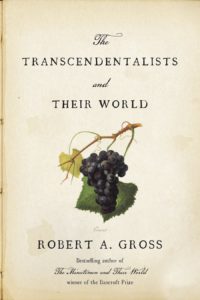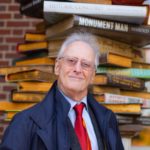Lecture Date: March 9, 2023
The Dovetail Cultural Resource Group Lecture

Transcendentalism is widely regarded as the first great intellectual movement of the new American republic. Yet, it arrived in the United States in the mid-1830s as a foreign import in language that many Americans found obscure and unintelligible. Within a few years the new philosophy was identified with the Boston area, and its epicenter was the small town of Concord, sixteen miles west of the state capitol. There Ralph Waldo Emerson, his protégé Henry David Thoreau, his friends Amos Bronson Alcott and Margaret Fuller, and a steady stream of acolytes put Concord on the map as a literary center. It became the home of the American Renaissance – a counterpart to Renaissance Florence and Goethe’s Weimer.
Why Concord, a small town of some 2,000 souls in 1830, devoted to farming, crafts, and commerce? This lecture will explore how Emerson, a Bostonian with family roots in Concord, and Thoreau, the only native son in the Concord group, drew on observations and experiences of the local scene to inform, inspire, and illustrate their novel ways of seeing and interpreting American life. Their joint biographies reveal the challenges facing individuals in a rapidly changing society. Seeking for new ways to comprehend the relation between individual and community, the Concord Transcendentalists articulated a fresh ideal of the self, in harmony with nature, on which a characteristically American philosophy of individualism, democratic and egalitarian, could be based. Thanks to the power of their writing, the “America” of Emerson’s essays and Thoreau’s Walden became Concord writ large.
Further Reading Resource List provided by CRRL
Speaker: Robert A. Gross

Robert A. Gross is James L. and Shirley A. Draper Professor of Early American History Emeritus at the University of Connecticut. A specialist in the social and cultural history of the United States from the Revolution to the Civil War, Gross focuses particularly on New England. His first book, The Minutemen and Their World (1976) received the Bancroft Prize in American History in 1977; it was reissued in a 25th anniversary edition by Hill & Wang in 2001. A revised and expanded edition has just appeared in paperback from Picador books, in commemoration of the 250th anniversary of the American Revolution. His studies of the Revolutionary period continued in the edited collection In Debt to Shays: The Bicentennial of an Agrarian Rebellion (1993).
Prof. Gross’s latest book is The Transcendentalists and Their World, published by Farrar, Straus & Giroux and chosen by the Wall Street Journal as one of the ten best books of 2021. A cultural study of major American writers and a deep social biography of a place and an idea, the book traces the impact of capitalism, democracy, and social reform on nineteenth-century Concord, Massachusetts. A village of 2,000 souls, Concord was home to such luminaries as Ralph Waldo Emerson, Henry David Thoreau, Nathaniel Hawthorne, and the Alcotts but also to cotton-mill girls, Black laborers, Irish railroad workers, hardscrabble farmers, and aspiring mechanics and businessmen. This diverse and fluid population was integral to the character of the town and its response to the expansive forces of change. The Transcendentalists and Their World has received the Peter J. Gomes Memorial Book Award from the Massachusetts Historical Society for the best nonfictional book on the history of the Bay State published in 2021.
Prof. Gross has also been active in the development of the interdisciplinary field known as the history of the book. A former director of the Program for the History of the Book in American Culture at the American Antiquarian Society, he co-edited with Mary Kelley An Extensive Republic: Print, Culture, and Society in the New Nation, 1790-1840 (2010), volume two in the series A History of the Book in American Culture. He taught at Amherst College and the College of William and Mary before coming to UConn and has held visiting positions at Brandeis and Brown Universities. Active in historical organizations, Prof. Gross is a trustee of the Concord Museum and a director of the Thoreau Society of America; he has also served on the Councils of the American Antiquarian Society and of the Colonial Society of Massachusetts.